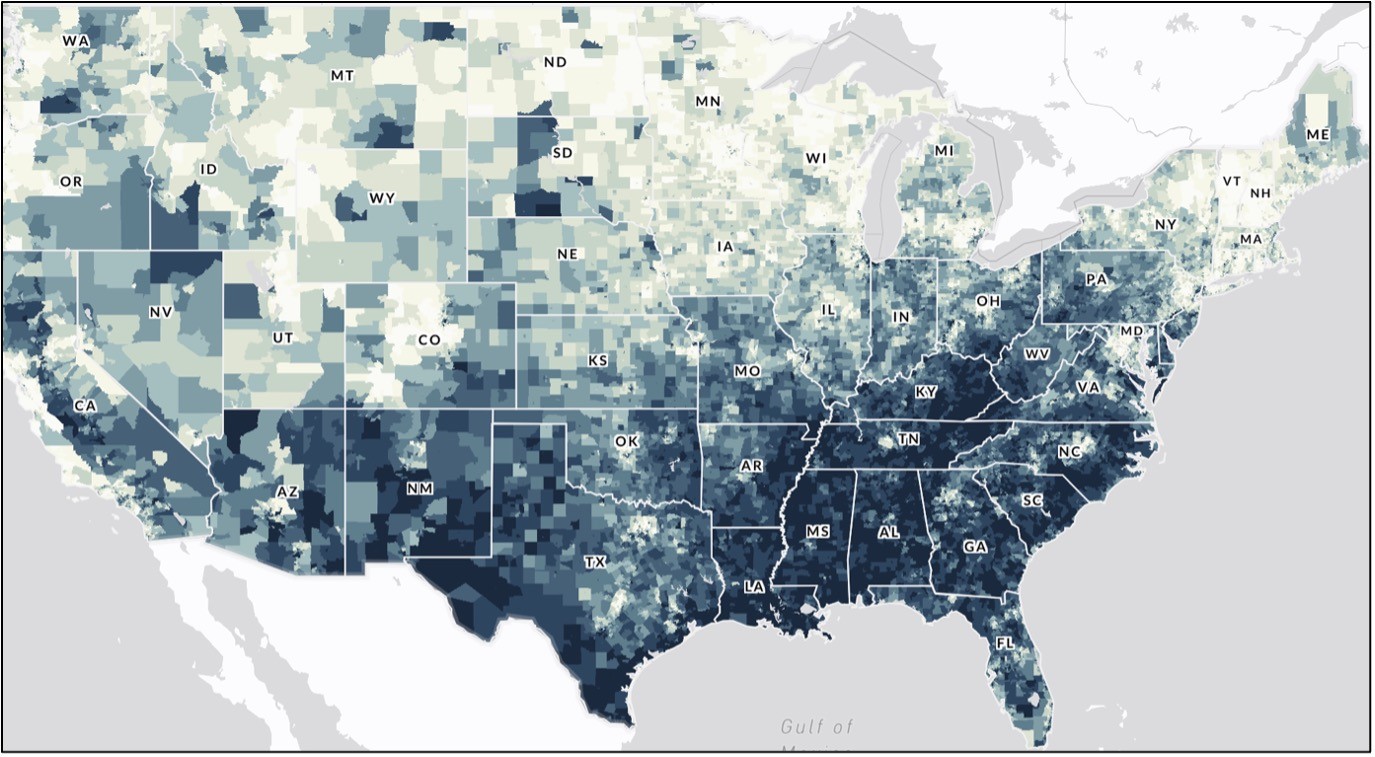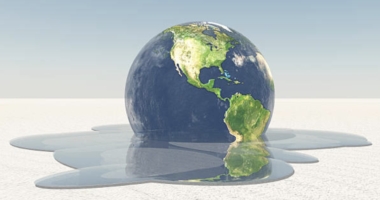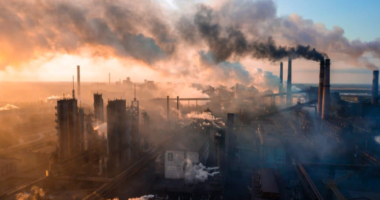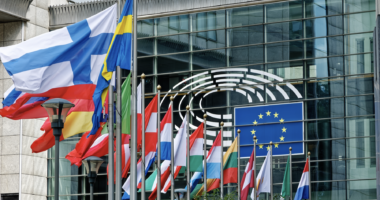Climate, Health and Equity Brief
Climate injustice—and the Pope speaks
October 9, 2023
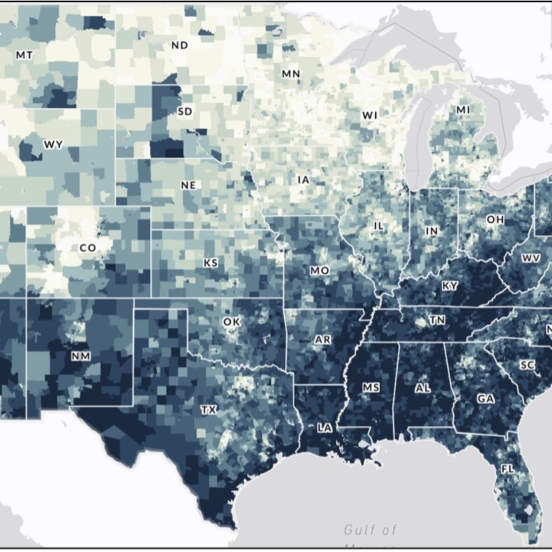
The Climate, Health & Equity Brief is GMMB’s take on the last two weeks’ news on the current impacts of climate change. If you haven’t subscribed yet, you can do so by clicking here.
Hot Topic: An unjust picture. This week, researchers released the U.S. Climate Vulnerability Index (CVI)—the most comprehensive screening tool to date showing where climate risks most imminently threaten communities throughout the United States. The results showcase the vulnerability of many U.S. communities to floods, fires, droughts, and pollution—and they highlight the ways location, income and lack of access to health care exacerbate these risks.
Developed by researchers at the Environmental Defense Fund and Texas A&M University, the CVI tool, linked below, applied nearly 200 data sets to 70,000 U.S. census tracts to visualize the present-day climate impacts that threaten many U.S. communities. The study paints a particularly bleak picture for the U.S. Gulf Coast, with industrialized communities in the Deep South—which have long suffered from systemic racism and neglect—at greatest risk.
Accordingly, results highlight major environmental justice concerns. Despite being just 12% of the U.S. population, Black residents make up 30% of the population within these top 10 counties. Researchers found that vulnerable groups will be disproportionately affected due to greater exposure to climate risks and lower ability to prepare, adapt, and recover from their effects. Beverly Wright, founder of the Deep South Center for Environmental Justice, declared that “Black communities in the Deep South are in the fight of their lives to protect their community from years of environmental racism.”
Environmental inequity remains a massive challenge not only in the U.S. but globally, as the countries least responsible for the climate crisis increasingly bear its most horrific impacts. In advance of COP28, Pope Francis implored the United States and other affluent nations to do much more to help developing countries in the face of the crisis, and to take urgent and meaningful climate action for the benefit of the planet and humanity.
“The world in which we live is collapsing and may be nearing the breaking point,” the Pope said. “A broad change in the irresponsible lifestyle connected with the Western model would have a significant long-term impact.”
Human Health
Rising heat is undermining health progress globally as it expands the habitat of disease-carrying mosquitoes, worsens air quality, increases heat-related deaths, and leads to more cholera outbreaks, making it the biggest single threat to public health—yet experts say only 0.5% of climate funding is allocated to health projects. (The New York Times)
On the heels of Earth’s hottest summer on record, new research has found that during periods of higher temperatures, drug and alcohol-related hospital admissions increase. (Forbes)
Planetary Health
September 2023 set a shocking new global temperature record, surpassing the previous high in 2020 by a full 0.5°C (0.9F)—nearly half of all the warming the world has seen since the pre-industrial era—an acceleration that climate scientists are struggling to describe. (Bloomberg)
A new study shows that rising temperatures are driving more than 100 species of frogs and other amphibians to extinction due to their inability to regulate temperature and moisture levels in a hotter climate. (The Washington Post)
According to the International Energy Association, limiting global warming to 1.5°C to prevent the worst effects of climate change is still possible with aggressive emission reductions. (Grist and NPR)
Equity
Pope Francis issued a clarion call for climate action, imploring the United States and other affluent nations to significantly increase their support for impoverished countries in the fight against the intensifying climate crisis. (The Washington Post)
The new Climate Vulnerability Index developed by the Environmental Defense Fund and researchers at Texas A&M University mapped the climate risks of all local communities, in the U.S., revealing seven of the 10 counties most at-risk have a much greater share of Black residents than the U.S. average. (Grist, Capital B)
President Biden emphasized the United States’ commitment to addressing climate change in the Pacific Island region, pledging $200 million in new assistance for Pacific Islands Forum nations to combat climate change and improve infrastructure. (NPR)
Sixteen technical centers have been rolled out by the EPA to help community organizations in historically underserved and overburdened regions apply for federal grants to facilitate climate resiliency in their communities as part of the Justice40 initiative. (Inside Climate News)
Politics & Economy
According to a new U.S. poll, religiously unaffiliated individuals and Hispanic Catholic Americans are the most likely to believe climate change is caused by humans (76%), while white evangelical Protestants are the least likely to believe so (31%)—with 19% of the latter denying any evidence of climate change at all. (Axios)
A recent Associated Press/NORC poll found that nearly 90 percent of Americans have experienced extreme weather in the last five years, with over 60 percent now attributing it at least partially, to climate change—a 10-point increase from previous months. (The Hill)
The Biden administration recently announced a plan to sell three oil and gas leases over five years, which represents the lowest number of lease plans since 1980, though it is still set to increase oil production. (The Guardian)
According to a study from George Mason University, people’s emotional responses to information about climate change significantly impact their support for climate policies, with guilt suppressing hope and anger and sadness boosting policy support, highlighting the importance of effective climate communication to drive action. (Aspen Public Radio)
An analysis of 20 of the world’s largest food and restaurant companies shows that over half have not made progress on their emission goals, with some even increasing emission levels. (The New York Times)
A U.S. Department of the Treasury report revealed that climate change will impose substantial financial costs on U.S. households in the coming years, with climate disasters recently impacting one in 10 households, conditions worsening, and intensifying climate-fueled disruptions expected to increase costs for energy and consumer goods nationwide. (CNBC)
Action
In response to conservative laws that suppress climate education and activism at schools across the U.S., students from more than 50 high schools are advocating for a Green New Deal for Schools that would require their districts to teach climate justice, create pathways to green jobs after graduation and plan for climate disasters. (The Guardian)
Kenya Electricity Generating Co., Kenya’s main power producer, is planning a 1,000-megawatt wind farm that would become Africa’s biggest and help the country reach its goal of achieving 100% renewable generating capacity by 2030. (Bloomberg)
An 11-year-old girl is one of six young people appearing in the European Court of Human Rights in a historic climate case fighting European governments to take more action to combat climate change. (The Guardian)
Life as We Know It
According to a new study published in the Proceedings of the National Academy of Sciences, working remotely or adopting a hybrid work schedule could reduce a person’s carbon footprint by over 50% by significantly lowering emissions associated with office energy use and commuting. (The Washington Post)
Plant breeders are developing new varieties of fruit that can withstand increasingly hostile weather, such as cauliflower and apples that don’t get burned by the sun, avocados and melons that require less water to grow and ripen, and carrots that can thrive in salty, dry drought soil. (The New York Times)
Kicker
Enter your address into the Climate Vulnerability Index tool to find out the vulnerability status of your neighborhood to dangers such as fire, flooding, drought and pollution.
Why do you want to preserve today a power that will be remembered for its inability to intervene when it was urgent and necessary to do so?
– Pope Francis
The GMMB Climate, Health & Equity Brief would not be possible without the contributions of the larger GMMB team—Thomas Baer, Aaron Benavides, Stefana Hendronetto, Nikki Melamed, Sharde Olabanji and Marci Welford. Feedback on the Brief is welcome and encouraged and should be sent to [email protected].

